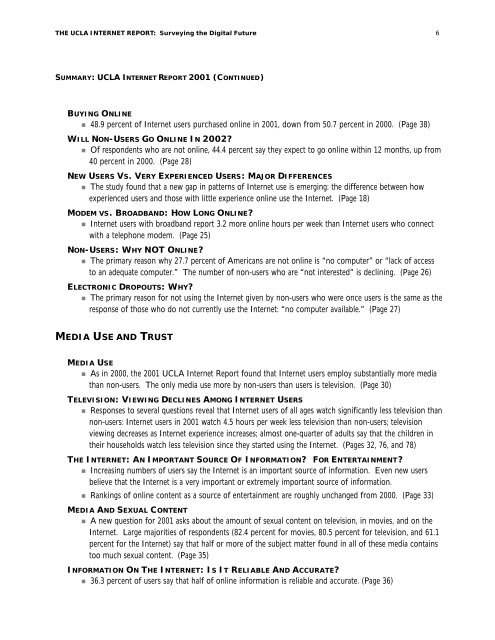UCLA Internet Report (online version) - Center for the Digital Future
UCLA Internet Report (online version) - Center for the Digital Future
UCLA Internet Report (online version) - Center for the Digital Future
You also want an ePaper? Increase the reach of your titles
YUMPU automatically turns print PDFs into web optimized ePapers that Google loves.
THE <strong>UCLA</strong> INTERNET REPORT: Surveying <strong>the</strong> <strong>Digital</strong> <strong>Future</strong> 6<br />
SUMMARY: <strong>UCLA</strong> INTERNET REPORT 2001 (CONTINUED)<br />
BUYING ONLINE<br />
� 48.9 percent of <strong>Internet</strong> users purchased <strong>online</strong> in 2001, down from 50.7 percent in 2000. (Page 38)<br />
WILL NON-USERS GO ONLINE IN 2002?<br />
� Of respondents who are not <strong>online</strong>, 44.4 percent say <strong>the</strong>y expect to go <strong>online</strong> within 12 months, up from<br />
40 percent in 2000. (Page 28)<br />
NEW USERS VS. VERY EXPERIENCED USERS: MAJOR DIFFERENCES<br />
� The study found that a new gap in patterns of <strong>Internet</strong> use is emerging: <strong>the</strong> difference between how<br />
experienced users and those with little experience <strong>online</strong> use <strong>the</strong> <strong>Internet</strong>. (Page 18)<br />
MODEM VS. BROADBAND: HOW LONG ONLINE?<br />
� <strong>Internet</strong> users with broadband report 3.2 more <strong>online</strong> hours per week than <strong>Internet</strong> users who connect<br />
with a telephone modem. (Page 25)<br />
NON-USERS: WHY NOT ONLINE?<br />
� The primary reason why 27.7 percent of Americans are not <strong>online</strong> is “no computer” or “lack of access<br />
to an adequate computer.” The number of non-users who are “not interested” is declining. (Page 26)<br />
ELECTRONIC DROPOUTS: WHY?<br />
� The primary reason <strong>for</strong> not using <strong>the</strong> <strong>Internet</strong> given by non-users who were once users is <strong>the</strong> same as <strong>the</strong><br />
response of those who do not currently use <strong>the</strong> <strong>Internet</strong>: “no computer available.” (Page 27)<br />
MEDIA USE AND TRUST<br />
MEDIA USE<br />
� As in 2000, <strong>the</strong> 2001 <strong>UCLA</strong> <strong>Internet</strong> <strong>Report</strong> found that <strong>Internet</strong> users employ substantially more media<br />
than non-users. The only media use more by non-users than users is television. (Page 30)<br />
TELEVISION: VIEWING DECLINES AMONG INTERNET USERS<br />
� Responses to several questions reveal that <strong>Internet</strong> users of all ages watch significantly less television than<br />
non-users: <strong>Internet</strong> users in 2001 watch 4.5 hours per week less television than non-users; television<br />
viewing decreases as <strong>Internet</strong> experience increases; almost one-quarter of adults say that <strong>the</strong> children in<br />
<strong>the</strong>ir households watch less television since <strong>the</strong>y started using <strong>the</strong> <strong>Internet</strong>. (Pages 32, 76, and 78)<br />
THE INTERNET: AN IMPORTANT SOURCE OF INFORMATION? FOR ENTERTAINMENT?<br />
� Increasing numbers of users say <strong>the</strong> <strong>Internet</strong> is an important source of in<strong>for</strong>mation. Even new users<br />
believe that <strong>the</strong> <strong>Internet</strong> is a very important or extremely important source of in<strong>for</strong>mation.<br />
� Rankings of <strong>online</strong> content as a source of entertainment are roughly unchanged from 2000. (Page 33)<br />
MEDIA AND SEXUAL CONTENT<br />
� A new question <strong>for</strong> 2001 asks about <strong>the</strong> amount of sexual content on television, in movies, and on <strong>the</strong><br />
<strong>Internet</strong>. Large majorities of respondents (82.4 percent <strong>for</strong> movies, 80.5 percent <strong>for</strong> television, and 61.1<br />
percent <strong>for</strong> <strong>the</strong> <strong>Internet</strong>) say that half or more of <strong>the</strong> subject matter found in all of <strong>the</strong>se media contains<br />
too much sexual content. (Page 35)<br />
INFORMATION ON THE INTERNET: IS IT RELIABLE AND ACCURATE?<br />
� 36.3 percent of users say that half of <strong>online</strong> in<strong>for</strong>mation is reliable and accurate. (Page 36)


